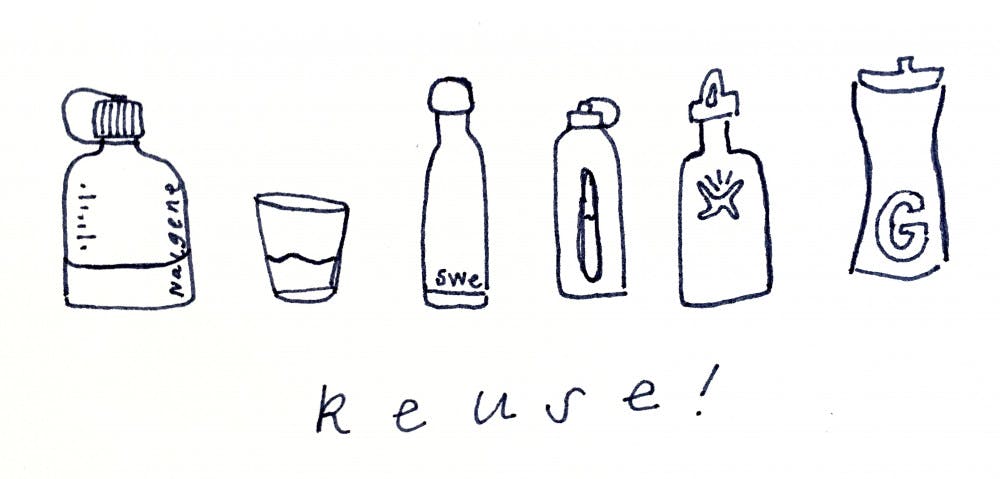To address student concern about a lack of water bottle filling stations on campus, the Undergraduate Council of Students’ committee on campus life has submitted a proposal to the Department of Facilities Management to add 10 new stations around the University.
Brown has been working to eliminate single-use plastic water bottles on campus since 2008, when it promised to decrease disposable water bottle use by 80 percent on campus over the following four years, according to the Brown is Green initiative’s website. Today, Brown Dining Services “does not sell single-use plastic bottles of still water,” wrote Ann Hoffman, director of administration at Dining Services, in an email to The Herald. The University also provides every first-year with a reusable bottle on move-in day, according to the website.
But several parts of campus suffer from a lack of water filling stations, making it difficult for community members to refill reusable bottles, said several students interviewed by The Herald.
Claire Heiden ’21, a member of the UCS campus life committee, referred to these areas as “water deserts” — places where “literally, there’s no access” to filtered water.
In Keeney Quadrangle, for example, there are no water bottle filling stations anywhere in the residence’s three first-year dorms. The quad serves as the “largest self-contained residential unit on campus” and houses about 600 students, according to the Office of Residential Life’s website.
Heiden and Harold Truong ’21, another member of the committee, are coordinating the UCS initiative to put water stations in these areas, including the Watson Institute for International and Public Affairs, the Center for Information Technology and the Arnold Lounge in Keeney Quadrangle, Heiden said.
“The fact that people have to plan way ahead in order to fill up their water bottle is a big impediment,” she said, adding that it “undermines the University’s environmentally sustainable values.”
Though there is not currently a timeline for the implementation of this initiative, Heiden and Truong submitted a draft of the proposal earlier in the semester to Erin Donnellan, academic and student engagement coordinator at the Office of Energy and Environmental Initiatives in Facilities Management. Truong said they anticipate meeting with Facilities Management after the proposal is finalized.
“The first step is to assess the students’ proposal and bring other Facilities staff members into the conversation,” Donnellan wrote in an email to The Herald.
The initiative builds on a project started last year by Yutong Liu ’20, a former member of the committee, Truong said. Liu is still involved with the initiative, Heiden added.
Heiden and Truong’s proposal points to a UCS survey sent to undergraduate students earlier this year, in which about 89 percent of over 250 respondents ranked the importance of increasing access to water bottle filling stations as “four or more on a scale of one to five,” Truong said.
Because many students can only get water from bathroom sinks, “they are either buying bottled water (or) getting filters,” said Camila Pelsinger ’20, chair of campus life and vice president-elect of UCS.
The University has tested a representative sample of the water in every residence hall and determined that none contain lead levels above the Environmental Protection Agency’s action level of 15 parts per billion, according to the Environmental Health and Safety office. However, because of the potential health risks associated with any level of exposure, EPA guidelines state that drinking water should not contain any lead.
Multiple students interviewed by The Herald expressed concern about drinking tap water.
Zuhal Saljooki ’21, who lives in Keeney Quad, said she she worries water from the sink might contain lead. As a result, Saljooki goes outside her dorm to find filtered water.
“The closest place is the (Sharpe Refectory), … but then I have to use a meal swipe,” Saljooki said.
Emma Dennis-Knieriem ’21, who also lives in the quad, said she fills her water bottle from the sink but does not feel entirely comfortable doing so. “I was just told by (Residential Peer Leaders as) a warning … there is some worry about the water (and) there may be some kind of lead,” Dennis-Knieriem said. “I would definitely prefer to know that the water I’m drinking doesn’t have lead in it.”
Truong and Heiden said they will both continue to work on the project until the new water bottle filling stations are installed.
“I feel like this is something that shouldn’t even be negotiable,” Truong said. “We should have access to water in every building.”





